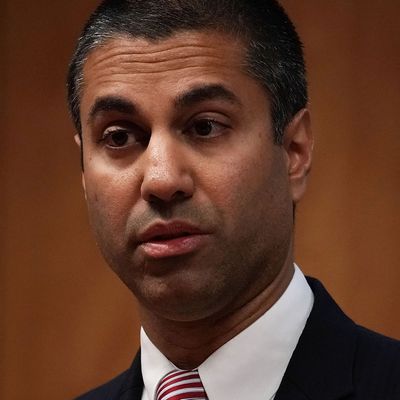
When Sinclair Media announced last year that it would buy Tribune Media for $3.9 billion, the stars seemed aligned for the deal to be approved and for the company to consolidate its grasp on American local news. Sinclair had boosted President Trump before the 2016 election, lending it credibility within the administration. FCC chairman Ajit Pai is an ideologue who enthusiastically endorsed the dismantling of net neutrality based on the idea that in the corporate media world, bigger is better. Perhaps most auspiciously, Pai approved rules last year that allowed broadcasters to own own far more stations than they were allowed previously, a regulation that seemed designed, to a suspicious degree, to help Sinclair.
And yet.
On Monday, Pai announced that he had “serious concerns” about Sinclair’s $3.9 billion proposed acquisition, and announced that he would send the deal for review by an administrative law judge, a move that will, at the least, delay the bid, and is likely to scotch it altogether.
The problems stem from Sinclair’s efforts — or lack thereof — to divest itself of media properties in order to satisfy federal ownership requirements. (Apparently, even Pai has his limits on such matters.) For months, Sinclair had been tweaking the deal, proposing to sell off 21 stations to placate the FCC. But in multiple cities, the stations would have been inherited by figures closely associated with the Smith family, a solution that raised hackles.
“The evidence we’ve received suggests that certain station divestitures that have been proposed to the FCC would allow Sinclair to control those stations in practice, even if not in name, in violation of the law,” Pai said in the statement.
As right-wing media juggernauts go, Sinclair remains less of a household name than Fox News, but it exerts enormous sway in the local news business. The company already owns 170 TV stations around the country, and adding the entirety of Tribune Media to its roster would have expanded its reach to major markets like New York and Chicago, allowing it access to about three-quarters of the American audience. That prospect frightened both liberals who worried about its propagandistic style and conservatives who feared that the company would gain an unfair advantage over right-wing competition.
“As I have noted before, too many of this agency’s media policies have been custom built to support the business plans of Sinclair Broadcasting,” FCC commissioner Jessica Rosenworcel, the only Democratic commissioner currently serving on the FCC, said in a statement. “With this hearing designation order, the agency will finally take a hard look at its proposed merger with Tribune. This is overdue and favoritism like this needs to end.”
Earlier this year, the company endured a firestorm of criticism after it mandated newscasters to read a pre-written message on local broadcasts railing against “fake stories” in the news media. Footage of anchors, some of whom objected to the message, reading off the robotic message, became a viral internet sensation.
It seemed inevitable that more people than ever would be exposed to such crude agitprop. But now, millions of Americans who want their news filtered through a reflexively pro-Trump filter may just have to settle for Sean Hannity.






























